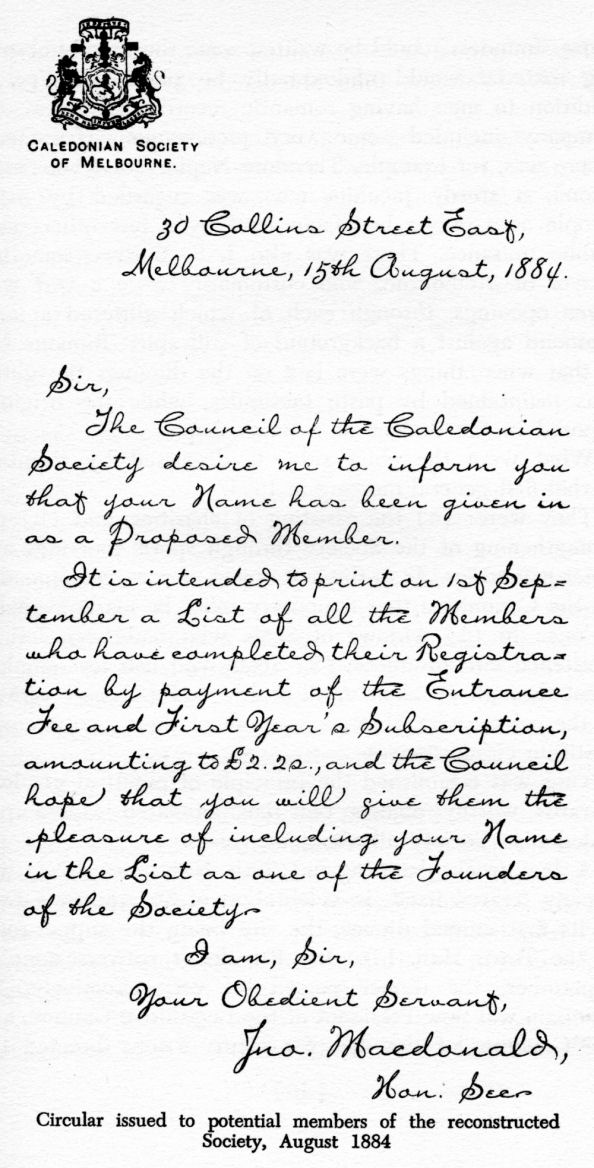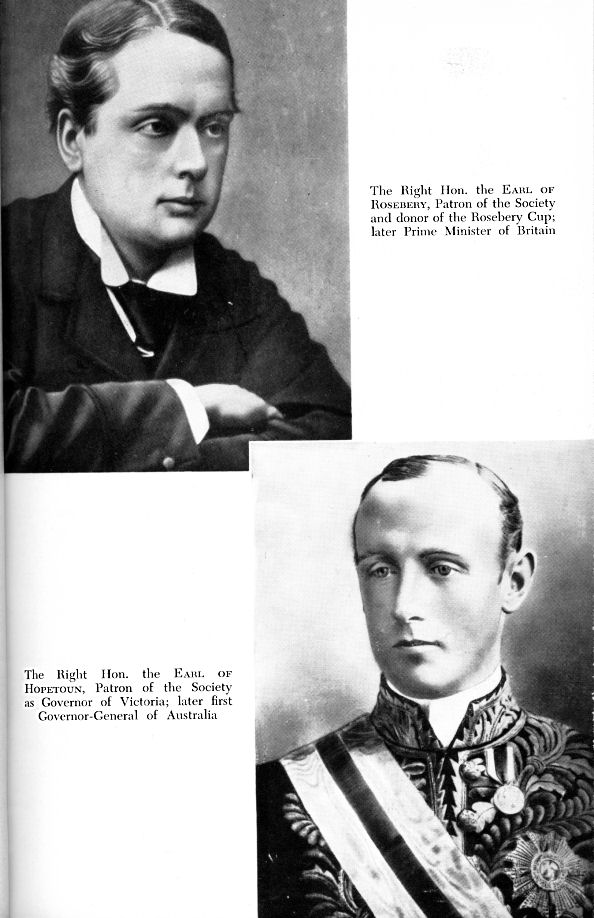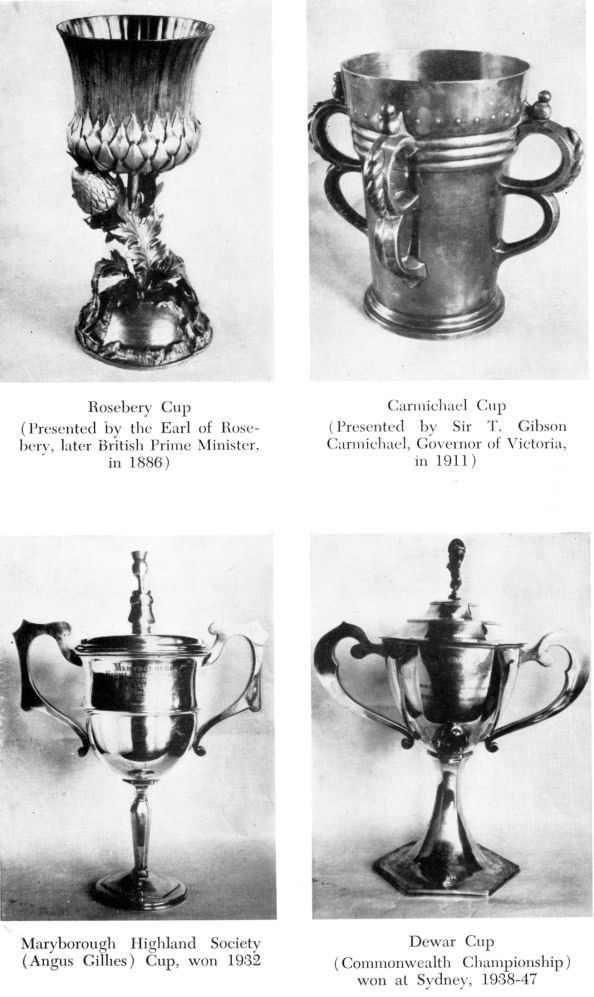|
Reconstruction in 1884 -
Hon. James Munro's Explanation - "Caledonian Society of Melbourne" - Hon.
James MacBain as first President - "Brilliant success" of first social -
Governor attends St Andrew's Dinner - Twelve toasts in one night - 394
members in first year - First sports meeting, rent free - Protest
against "anglicizing".
HAVING shown what they
could do when they put their minds to it-even to the extent of routing
English cricketers!-the Caledonians of Melbourne seem to have gone along
more or less quietly after 1861. All semi-public bodies fluctuate
considerably in strength over a lengthy period; and so it was, no doubt,
with the Caledonian Society during the late 1860's and the 1870's.
Eventually, on 12th June
1884 (and here is where Minute Books take up the story), a meeting was
held in the Equitable Co-operative Society's Hall, Melbourne, for the
purpose of putting new life into Caledonian affairs; or, to be more
definite, for the purpose of reconstructing "the present Melbourne
Caledonian Society" on "a more workable basis".
The phrases in
quotation-marks (which make it clear that the movement aimed at
reconstruction, and not the forming of a new body), were used by the
Chairman of the meeting, the Hon. James MacBain, a distinguished Scot who
had held Ministerial office; and he was supported by the President of the
old Society, another Scottish statesman, the Hon. James Munro, an eminent
financier who had been Minister for Education and was later to become
Victoria's Premier.
Mr Munro said that various
causes had united to bring the Caledonian Society to the verge of
extinction; therefore he, as President, and his fellow-officers had
resigned in order to permit a thorough reconstruction to be carried out.
One of the chief causes of
the Society's decline, Mr Munro added, was the smallness of the
entrance-fee and subscription-a statement which seems to suggest that the
Scots of the day imperilled the existence of their Society by
under-charging themselves!
Mr Munro moved:
That it is desirable to
have a Caledonian Society in Melbourne, and this meeting resolves to form
a society as nearly as possible on the principles of the London Caledonian
Society.
Mr John McGregor seconded
the motion, which was supported by Dr. McMillan and several others present
and carried unanimously.
Thus in June of 1884
Melbourne's Caledonian Society took on a new lease of life.
It was agreed that the
membership be unlimited (an amendment aiming at a limit of 200 being
defeated) and the entrance-fee was fixed at £1/1/-, with an annual
subscription of the same amount. Life-membership was fixed at £10/10/-.
At the next meeting of the
Society, held a fortnight later, Mr MacBain (again Chairman) announced a
membership of 120, including the Premier of the day, James Service (who
had been a foundation member of the Society of 1858) and several other
members of both Houses of Parliament.
The most important business
transacted at the meeting was the "christening" of the Society-as the
Caledonian Society of Melbourne-and the adopting of rules which had been
framed by a committee consisting of Messrs J. MacBain, J. Munro, John
Macdonald, Murdoch McLeod, and Captain R. Robertson.
Most of the time of the
next two meetings was occupied with the election of officers. Mr MacBain
was chosen President; Mr Munro as Vice-President; Mr John Macdonald as
Hon. Secretary, and Mr Colin Longmuir as Hon. Treasurer. For nine places
on the Committee there were no fewer than 28 candidates, of whom the
successful ones were: Thomas Baillie, L. C. Mackinnon, Murdoch McLeod,
Kenneth Gunn, Dr. T. L. McMillan, James Fergusson, W. K. Thomson, John
Blyth, and James Richmond.
A few weeks later (5th
September) the reconstructed Society indulged in its first social
gathering, Mr MacBain entertaining at his own expense approximately 1000
guests in Melbourne's Town Hall. Newspapers of the day describe that
function as having been "a brilliant success". The attendance, it is
stated, included many leading citizens, and the beautiful decorations,
plus the "magnificent costumes" of the ladies, created a very picturesque
scene.
Obviously, the Society had
got away to a good start. That fact was emphasized at the first quarterly
meeting (7th November) when President MacBain was able to announce that 18
life members and 270 ordinary members had been enrolled and that funds
already totalled £774.

A printed list of the names
of those early members styled "List of Founders" - is still extant. It
reveals the presence of more than 60 assorted Macs among the goodly
company. More important, it reveals that the members included a
considerable number of personalities (such as the
pastoralist-philanthropist Francis Ormond and the newspapermen David Syme
and Lachlan Mackinnon), who had already done, or were to do, a great deal
towards building up the nation.
In point of fact, if the
life-stories of a cross-section of those "founders" could be written some
thoroughly absorbing material would undoubtedly be presented. For, in
addition to men having romantic records of success, the company included
some very picturesque "characters". There was, for example, Theodore
Napier (of whom more anon), a sturdy Jacobite who was regarded by many
people as a public benefactor and by a few others as a public nuisance.
There was also J. S. Butters, sometime Mayor of Melbourne, who customarily
wore a vest with three openings, through each of which glittered a large
diamond against a background of stiff shirt. Rumour had it that when
things were bad on the diggings the glitter was maintained by paste
facsimiles, while the originals reposed in the drawer of a pawn-shop.
What were the chief
subjects discussed by members at that first general meeting in 1884?
They were: (a) the
assisting of charities, and (b) the strengthening of the Society through
sports meetings and other gatherings. As to the first object, it was
recommended by the Committee that temporary relief be made available at
once to (1) widows of Scots who had been left in straitened circumstances;
(2) Scots who had lost employment through accident or ill-health, and (3)
new arrivals in the colony who, through no fault of their own, were in
destitute circumstances.
Thus was established the
principle of practical goodwill towards worthy objects that has animated
Melbourne's Caledonian Society all along the years.
A few weeks later again
(29th November 1884 ) the Society treated itself, in celebration of St.
Andrew's Day, to its first annual dinner, the site being the supper-room
of the Town Hall. Like the President's conversazione of September, the
dinner passed off very effectively. Mr MacBain was now President of the
Legislative Council, and the Governor of the day, Sir Henry Loch, directed
the assembly's attention to the fact-he said it emphasized his belief that
"Scots generally succeed in any path of life they may enter".
What a spate of speeches
the guests encountered that night! Here, in all its majesty, is the Toast
List:
The Queen
The Prince and Princess of Wales
His Excellency the Governor
The Caledonian Society of Melbourne
The Charitable Objects of the Society
The Mayor of Melbourne
Kindred Societies
Our Visitors
The Land o' Cakes
The Land of our Adoption
The Clergy
The Members of Council
Not the least interesting
of the speeches was that made by Mr W. K. Thomson, who proposed the toast
dealing with charitable objects. Firstly, he said that the Society was
very favoured in having as Patron a Scottish Governor and as President the
first Scottish President of the Legislative Council. Secondly, he revealed
that donations subscribed in the room, in conjunction with this toast,
amounted to £303.
Three hundred pounds (drawn
from an audience numbering 148) was a stout achievement in 1884. It is
clear that our predecessors put their hands in their "pooches" to some
purpose. What is more, levies of the kind did not scare off other Scots,
for at the next meeting of the Society, held a couple of weeks later, 56
new members were enrolled.
Activities for 1884 ended
with a flourish-a Scottish concert was held in the Athenaeum Hall and it
drew an attendance of approximately 800. A programme of that concert,
pasted in the old Minute Book, survives in good order to this day.
Incidentally, it was
announced during the evening that the Society was sponsoring competitions
for original poems and essays, prizes for the purpose having been donated
by the Hon. Francis Ormond, M.L.C. (Mr Ormond, an Aberdonian who had made
a good deal of money on the land in Victoria, was the public-spirited
citizen who later gave £100,000 to endow Ormond College within the
University of Melbourne, £20,000 to endow a Chair of Music, £11,000 to the
Working Men's College, and other large sums to hospitals. He died in 1889,
aged 69 years. His memory is honoured by a statue in Latrobe Street,
Melbourne).
So ended the first six
months' operations activities of the reconstructed Society. What a
fruitful period it was!
Progress continued during
1885. At the first quarterly meeting (6th March) the Hon. Secretary
revealed that membership had risen in four months from 288 to 394. Funds
were healthy, he said, and various cases of distress had been relieved.
In the following month the
Society broke out in a new direction by conducting a sports meeting;
and-believe it or not!-the Melbourne Cricket Ground was obtained for the
purpose free of charge. Piping, dancing, racing, tossing the caber,
putting the stone, and other events were on the programme, and everything
passed off satisfactorily.
In view of the Society's
healthy body of achievement, it is not surprising that all the officers
were re-elected at the first annual meeting, held on 14th August (1885).

Other happenings of
interest at that meeting included a decision to form a Scottish Choral
Association under the auspices of the Society. In addition, the meeting
occupied itself for some time in debating a motion on a subject that is
still discussed at intervals. Sponsored by Mr Theodore Napier, the motion
read as follows:
That in view of the
anglicising tendency at present at work in the Colony and throughout the
whole of the British Dominions, whereby the terms "England" and "English"
are constantly and incorrectly used by officials and other public men,
both in Parliament and in the Press, to denote what is essentially
Imperial in character, in lieu of the proper names "Britain" and
"British", the Society records its energetic protest against their use in
this sense, as being contrary to the terms agreed on in the Act of Union
of the Kingdoms of England and Scotland which came into force in the year
1707.
That Scotsmen be called
upon to rally in defence of their name, and that a memorial be drawn up
urging the Government to remove by all means in its power the evil
complained of.
That pungent protest of
1885, it will be seen, is in line with the sentiments expressed by a
speaker at the first meeting of the original Society in 1858. Also, it is
in general agreement with a resolution adopted at the annual congress of
the Victorian Scottish Union as recently as 1948. Actually, though,
nothing came of Mr Napier's motion, for after spirited discussion it was
withdrawn.

Within a few weeks of the
Annual Meeting the newly formed Choral Society-known as the Caledonian
Society's Choir - was in active practice, and at the same time the
enterprising Committee (whose title had been changed to Council) was
considering the formation of a Rifle Club, was arranging for another St.
Andrew's dinner, and was examining a proposal to hold a Caledonian Ball.
Both the dinner and the
ball were brought off success fully, and they were followed soon
afterwards by another sports gathering and by the first concert of the
Caledonian Society's Choir.
In general, then, the
reconstructed Society had made healthy progress during its first eighteen
months of activity. |

